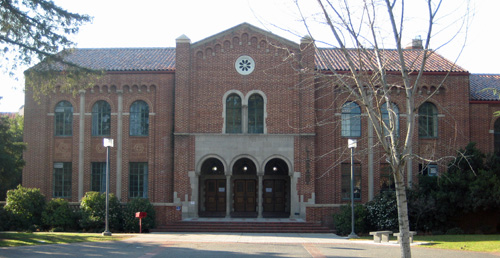C. J. Ryland (1892-1980)
Columbus J. Ryland was born in San Jose, California, on December 6, 1892. He studied at the Western Normal California School of Arts and Crafts. After passing his architectural examinations in 1916, he took a position as an engineer with Pacific Portland Cement Company. In 1918 Ryland entered military service and was sent to France. After the war he remained in France to study architecture at the University of Toulouse. He completed dozens of travel sketches of architectural subjects during this period.
Upon returning to the United States, Ryland joined the Fresno firm of Swartz & Swartz. After the death of A.C. Swartz in 1919, Ryland became Fred Swartz's partner in the firm. Swartz & Ryland conducted a brisk business doing residential, commercial, and school work throughout the Central San Joaquin Valley. Among their early Valley projects were the Rustigian Building (1920) in Fresno, the Carlton Hotel (1920) in Turlock, and the Lemoore City Hall (1925). By 1926 their influence extended to the Bay Area, where they designed the Union Stage Depot in Oakland. In 1927 they designed St. Brigid's Church and the handsome Cousins Residence in Hanford. Further expanding their territory, they opened a branch office in Monterey in 1928 and another in Salinas in 1931.
 Fresno's Tower District contains fine examples of Swartz &
Ryland's residential work, including homes for A.B. Clark (1924), Cleve Stout
(1924), and A.B. Knapp (1925). Their premier Fresno commission, however, was
the 1931 Fresno State College Library (now Fresno City College, shown on
right).
Fresno's Tower District contains fine examples of Swartz &
Ryland's residential work, including homes for A.B. Clark (1924), Cleve Stout
(1924), and A.B. Knapp (1925). Their premier Fresno commission, however, was
the 1931 Fresno State College Library (now Fresno City College, shown on
right).
During the mid-1930s Ryland established an independent practice in Monterey, capturing such important commissions as Monterey City Hall (1936) and Santa Cruz City Hall (1937). Ryland continued his career after World War II designing buildings for the Santa Clara County Fairgrounds in San Jose.
C. J. Ryland died on January 30, 1980, in Walnut Creek, California.
©1997 John Edward Powell. All rights reserved.